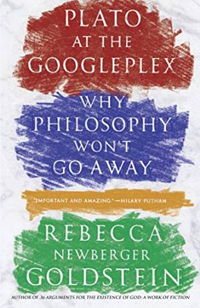 Rebecca Goldstein, Plato at the Googleplex: Why Philosophy Won’t Go Away (New York: Pantheon, 2014), 480pp.
Rebecca Goldstein, Plato at the Googleplex: Why Philosophy Won’t Go Away (New York: Pantheon, 2014), 480pp.
A review by physicist Brad Keister. Brad and his wife Katie worship at Washington Community Fellowship, on Capitol Hill in Washington, DC.
Plato at the Googleplex is the latest book from Rebecca Goldstein. After receiving a Ph.D. in philosophy at Princeton, Goldstein turned to writing novels and essays, eventually winning a MacArthur Fellowship.
The reader gets pulled in with the opening title chapter. Plato is on a book tour in the early 21st century, and is managed by a self-assured young agent who takes it upon herself to guide him through a world that she considers to be completely out of his element.
The first stop is the Googleplex — the famous dining hall at Google headquarters where some of the best and brightest exchange ideas on just about everything — just before Plato is scheduled to give the invited lecture. In the dining hall, Plato encounters a variety of people, each quite confident in their own beliefs. Through his method of questioning that leads to deep underlying principles, he exposes (and often dismantles) their belief systems, while at the same time the reader realizes that this is in fact a classic Socratic dialogue with modern characters inhabiting archetypal figures.
The book alternates between reflective essays and further stops on Plato’s book tour, which include the New York 92nd St. Y (about child rearing), an advice columnist, a cable news personality, and a neuroscience laboratory. The interleaved essays describe the climate of politics and ideas during the days of Socrates, and how philosophy mattered then — to the point of a death sentence for Socrates.
The subtitle of the book, "Why Philosophy Won’t Go Away," is a key focus of the book, and Goldstein uses both the stories and the essays to make that case. In particular, she devotes considerable space to “philosophy jeerers,” notably scientists who hold the view that a long time ago philosophy asked all the big questions and proposed answers, but science is gradually chipping away at them and will eventually make philosophy irrelevant.
While Goldstein is a professed atheist (having left the Orthodox Judaism of her upbringing), this position and some of its arguments are similar to those of Christians who face similar claims of irrelevancy. There is much to gain here in a book that recasts the great dialogues of Plato in a relevant modern context.


